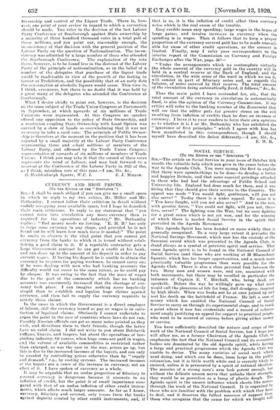CURRENCY AND MOH PRICES.
IT° Tilt EDITOR or III. " SPECIATOR."1 Sins—I shall be much obliged if you can give me a small space in which to reply to my two critics, Mr. Miller and Mr. Botbamley. I cannot follow their criticism in detail without unduly occupying your available space, but I hope to demolish their main criticiams. In reply to my statement that "you cannot force into circulation any more currency than is required for the operations of industry," Mr. Bothamley replies "Bad money needs no forcing. 'N. IL B.' has only to forge some currency in any shape, and provided lie is not found out he will learn how much force is needed." The point he omits to observe is the vital point that you cannot get currency from the banks to which it is issued without estab- lishing a good claim to it. If a reputable contractor gets a large Government contract he can get a credit at his bank, and can draw up to the amount of his deposit in order to pay current wage'. If having his deposit he is unable to obtain the currency lie reauires for paying workmen, he cannot carry on; if he were dealing with men who had banking accounts the difficulty would not occur to the same extent, as he could pay by cheque. It was owing to the fact that the mass of wages duo to the part of the community which has no banking accounts was enormously increased that the shortage of cur- rency took place. I can imagine nothing more hopelessly stupid than to establish and legalize huge claims against currency, and then fail to supply the currency requisite to satisfy those claims.
In the cases in which the Government is a direct employer of labour, still the currency issued as pay or wages is in satis- faction of legalized claims. Obviously I cannot undertake to argue the point in the case of countries where laws do not run. Possibly Russian officials can get as many notes printed as they wish, and distribute them to their friends, though the latter have no valid claim. I did not write to you about Bolshevik ruffians, knaves, and forgers, but about the operations of law- abiding industry. Of course, when huge sums are paid in wages. end the volume of available commodities is restricted rather than enlarged, as was the case in the war, prices go up, hut this is due to the increased incomes of the buyer's, and can only be avoided by controlling prices otherwise than by "supply and demand," e.g.. by costing systems. The increased incomes of the buyers are a cause of the increase in currency, not an effect of it. I have spoken of currency as a whole.
It may be arguable that an undue proportion of fiduciary to covered carrency is dangerous because it amounts to an inflation of credit, but the point is of small importance com- pared with that of an undue inflation of other credit instru- ments, which affects much larger amounts. As far as I know, currency, fiduciary and covered, only issues from the banks against deposits created by other credit instruments, and, if
that is EC, it is the inflation of credit other than currency notes which is the real cam* of the trouble.
Easy credits mean easy spending; large wages in the hopes of large gains; and involve increases in currency when the spending is in wages. Then it follows that to keep a proper proportion of the currency covered gold has to be made uneven.- able for eases of other credit operations, as the amount is limited. Finally, may I refer your correspondents to the interim report of the COMMiOSi011 on Currency and Foreign Exchanges after the War, papa. 36?—
" Under the arrangements which we contemplate virtually the whole amount of the currency gold in the country will be held in a central reserve at the Bank of England, and the circulation, in the wide sense of the word in which we use it, will consist in part of fiduciary notes and, as regards the balance, of notes covered by that reserve. The total amount of the circulation being automatically fixed, it follows," Ice., Sze.
Thus the main point I have contended for, viz., that the total amount of the currency in circulation is automatically fixed, is also the opinion of the Currency Commimion. I my critics will refer to the banking number of the Economist they will see that the editor puts far greater stress on the evil resulting from inflation of credits than he does on increase of currency. I leave it to your readers to form their own opinions as to whether it is I or Mr. Bothamley who has exhibited the "ignorance of first principles" which I agree with him has been manifested in this correspondence, though I should myself have described the defect differently.—! am, Sir, Sc.,
E. H. B,






































 Previous page
Previous page